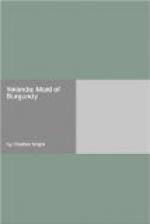During the last week in March we approached Basel. Max had saved the merchant’s life; we had protected the caravan from robbery; and good Franz was grateful. Notwithstanding our sure reward, Max was gloomy. The future had lost its rosiness; his wound did not readily heal; Basel was half a hundred leagues off our road to Burgundy. Why did we ever come to Switzerland? Everything was wrong. But no man knows what good fortune may lurk in an evil chance.
At the close of a stormy day we sighted Basel from the top of a hill, and soon the lights, one by one, began to twinkle cosily through the gloaming. All day long drizzling rain and spitting snow had blown in our faces like lance points, driven down the wind straight from the icy Alps. We were chilled to the bone; in all my life I have never beheld a sight so comforting as the home lights of the quaint old Swiss city.
Franz soon found a wherry and, after crossing the Rhine, we marched slowly down the river street, ducking our heads to the blast. Within half an hour we passed under a stone archway and found ourselves snug in the haven of our merchant’s courtyard. Even the sumpter mules rejoiced, and gave forth a chorus of brays that did one’s heart good. Every tone of their voices spoke of the warm stalls, the double feed of oats, and the great manger of sweet hay that awaited them. Before going into the house Max gave to each mule a stroke of his hand in token of affection. Surely this proud automaton of Hapsburg was growing lowly in his tastes. In other words, nature had captured his heart and was driving out the inherited conventions of twenty generations. Five months of contact with the world had wrought a greater cure than I had hoped five years would work. I was making a man out of the flesh and blood of a Hapsburg. God only knows when the like had happened before.
Max and I were conducted by a demure little Swiss maid to a large room on the third floor of the house, overlooking the Rhine. There was no luxury, but there was every comfort. There were two beds, each with a soft feather mattress, pillows of down, and warm, stuffed coverlets of silk. These were not known even in the duke’s apartments at Hapsburg Castle. There we had tarnished gold cloth and ancient tapestries in abundance, but we lacked the little comforts that make life worth living. Here Max learned another lesson concerning the people of this world. The lowly Swiss merchant’s unknown guest slept more comfortably than did the Duke of Styria.
When we went down to supper, I could see the effort it cost Max to sit at table with these good people. But the struggle was not very great; five months before it would have been impossible. At Hapsburg he sat at table with his father and mother only; even I had never sat with him in the castle. At Basel he was sitting with a burgher and a burgher’s frau. In Styria he ate boar’s meat from battered silver plate and drank sour wine from superannuated golden goblets; in Switzerland he ate tender, juicy meats and toothsome pastries from stone dishes and drank rich Cannstadt beer from leathern mugs. His palate and his stomach jointly attacked his brain, and the horrors of life in Hapsburg appeared in their true colors.




